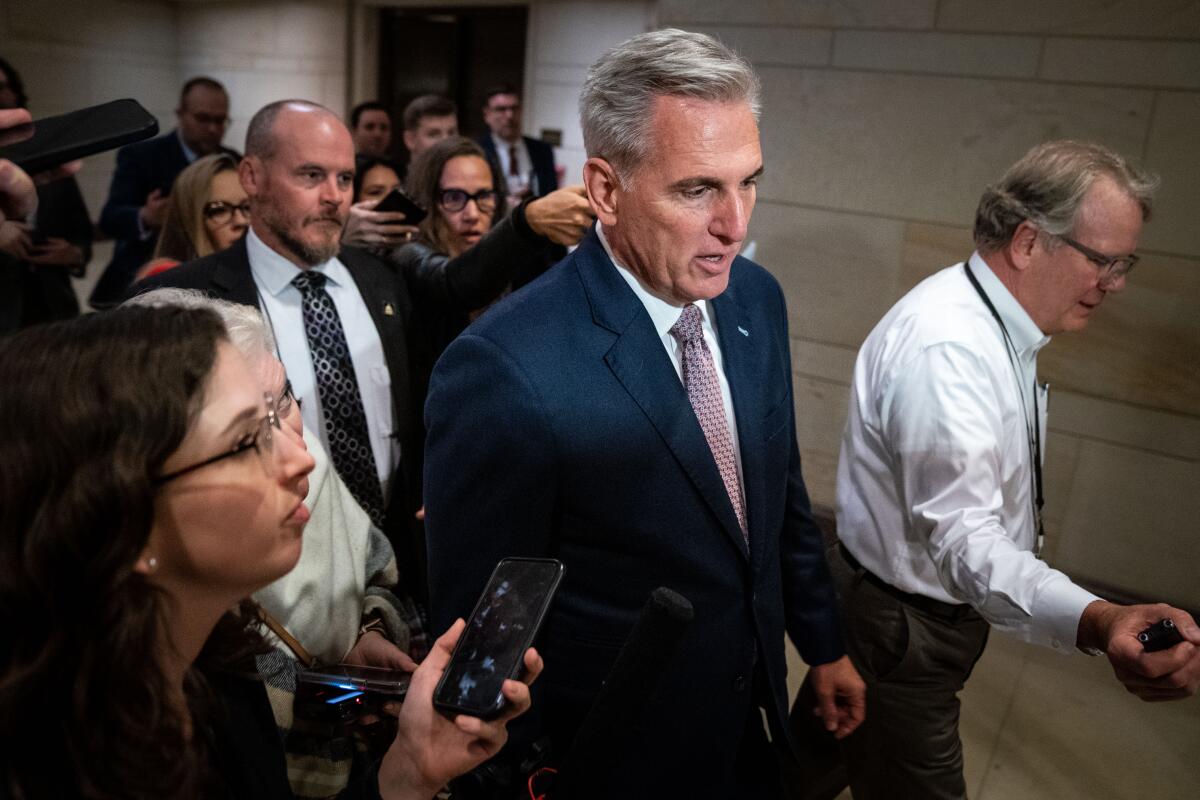Kevin McCarthy wins GOP nomination for House speaker

- Share via
WASHINGTON — House Republicans voted Tuesday to nominate Minority Leader Kevin McCarthy as the next speaker, putting the Bakersfield lawmaker on track to achieve a long-sought ambition.
But while the GOP is on the verge of securing a narrow House majority, its surprisingly poor performance in last week’s midterm election forced McCarthy to scramble much harder than anticipated to keep his caucus united and behind him.
Even if he wins the top job when the new House convenes in January and elects a speaker, McCarthy faces a difficult road in corralling the party’s factions.
The Bakersfield congressman’s ideological flexibility, fundraising prowess and management of Donald Trump have helped him hold House Republicans together as they head into the midterm elections. Now he’s on the verge of gaining the prize he has long desired.
In a secret ballot Tuesday afternoon, a majority of the participating current House members and those just elected supported McCarthy.
He beat back an 11th-hour challenge from House Freedom Caucus member Rep. Andy Biggs (R-Ariz.), who received 31 votes to McCarthy’s 188. But it demonstrated that McCarthy has yet to convince all his party’s members.
And given what is expected to be a narrow House majority, he will need nearly every single GOP vote to secure the 218 votes needed to become speaker, and later, to pass legislation.
McCarthy is eager to avoid a repeat of his failed bid for the speakership in 2015, when opposition from the GOP’s right-flank House Freedom Caucus doomed his chances after the ouster of Speaker John A. Boehner (R-Ohio).
Since then, McCarthy has worked to win over his party’s most conservative factions, including supporters of former President Trump.
But with the GOP set to take control of the House, the Freedom Caucus is flexing its muscles again. The historically tight-knit group has shown itself to be highly influential when Republicans are in power.
Before throwing its support behind McCarthy, the caucus is demanding changes for the next Congress.
Among other things, it wants committee members to directly elect their chairs and a requirement that a majority of House Republicans support any bill before it can be brought to the floor for a vote.
Most notably, the caucus wants to reinstate a parliamentary process that would make it easier to remove a speaker, the tool that ultimately led to Boehner’s resignation in 2015.
It remains unclear whether McCarthy will support any of those demands.
He and his allies, however, are working hard behind the scenes to shore up support.
Firebrand Rep. Marjorie Taylor Greene (R-Ga.), a member of the Freedom Caucus, said Monday on Stephen K. Bannon’s “War Room” podcast that undermining McCarthy or seeking an alternative speaker was “bad strategy.”
Meanwhile, some centrist McCarthy supporters are challenging the Freedom Caucus.
Rep. Don Bacon (R-Neb.) told NBC News that he would be willing to work with Democrats to elect a moderate Republican to the speakership if his party can’t coalesce behind a candidate.
Some Republicans have even lobbied Rep. Henry Cuellar of Texas, a conservative Democrat who opposes abortion rights, to switch parties, according to the Wall Street Journal.
Rep. Mike Garcia (R-Santa Clarita), who’s leading his Democratic challenger in a race that hasn’t been called yet, predicted Republicans will be on the same page come Jan. 3, when the new House convenes.
“We’re going to be able to get things done regardless of how thick our majority is,” Garcia said. But to accomplish anything, he added, “we’ve got to be unified as a team.”
The flurry of activity is indicative of how difficult it may be for McCarthy to govern, with Trump-aligned conservatives on one side and moderates on the other. Current Speaker Nancy Pelosi (D-San Francisco) knows the challenges well, as she has had to navigate between Democrats’ moderates and progressives with a narrow majority.
With President Biden in the White House and Democrats retaining control of the Senate, Washington could see a return to gridlock, outside of must-pass legislation for government funding and raising the debt ceiling.
Even a small majority would empower Republicans to launch investigations into the Biden administration and pass messaging bills to excite the base of Republican voters.
The GOP House leadership vote came on the same day Trump announced his third campaign for president.
Senate Republicans are expected to hold their internal leadership elections Wednesday, though some Republicans have said it should be postponed until after the Dec. 6 runoff between Democratic Sen. Raphael Warnock and former football star Herschel Walker, a Republican. That race, however, will only determine whether Democrats have a 50-seat majority or a 51-seat majority.
More to Read
Get the L.A. Times Politics newsletter
Deeply reported insights into legislation, politics and policy from Sacramento, Washington and beyond. In your inbox twice per week.
You may occasionally receive promotional content from the Los Angeles Times.












